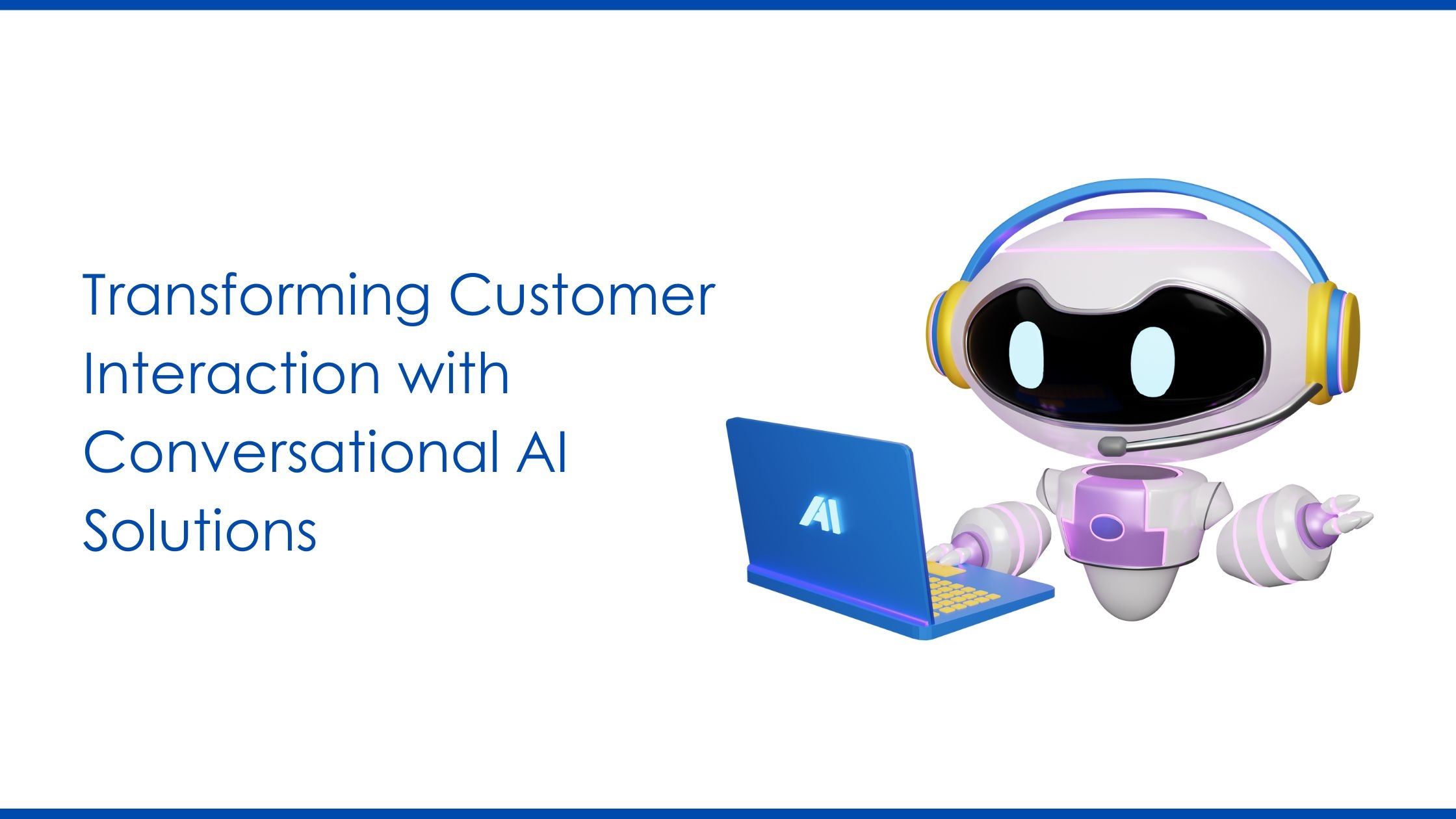Transforming Customer Interaction with Conversational AI Solutions

Introduction
In today’s digital world, customer expectations are higher than ever. Businesses must find innovative ways to meet these demands and provide exceptional customer service. Conversational AI solutions offer a transformative approach to customer interaction, enabling businesses to engage with their customers in a more personalized, efficient, and scalable manner. This blog explores the key benefits and applications of conversational AI in enhancing customer service.
What is Conversational AI?
Conversational AI refers to technologies that enable computers to understand, process, and respond to human language in a natural and meaningful way. These technologies include chatbots, virtual assistants, and voice recognition systems that leverage natural language processing (NLP) and machine learning to facilitate human-like conversations.
Benefits of Conversational AI Solutions
-
Personalized Customer Service Conversational AI solutions provide personalized interactions by understanding and analyzing customer data. AI-powered chatbots and virtual assistants can access customer history and preferences to offer tailored responses and recommendations. This level of personalization enhances customer satisfaction and loyalty.
-
24/7 Availability One of the most significant advantages of conversational AI is its ability to provide round-the-clock customer support. Unlike human agents, AI-powered systems do not require breaks or sleep, ensuring that customers can get assistance at any time of the day or night. This constant availability improves customer experience and reduces wait times.
-
Scalability Conversational AI solutions can handle multiple interactions simultaneously, making them highly scalable. This scalability is particularly beneficial during peak times or high-demand periods, as it ensures that all customer queries are addressed promptly without overwhelming the support team.
-
Cost Efficiency Implementing conversational AI can lead to significant cost savings for businesses. By automating routine customer service tasks, businesses can reduce the need for a large support team, lowering operational costs. Moreover, AI systems can handle high volumes of interactions, reducing the need for additional resources during busy periods.
-
Improved Accuracy and Consistency AI-powered systems provide consistent and accurate responses, eliminating the variability that can occur with human agents. This consistency ensures that customers receive reliable information and a uniform experience, regardless of when or how they interact with the business.
Applications of Conversational AI Solutions
-
Customer Support Conversational AI is widely used in customer support to handle common inquiries, troubleshoot issues, and provide information. AI chatbots can guide customers through troubleshooting steps, answer frequently asked questions, and escalate complex issues to human agents when necessary.
-
Sales and Marketing Conversational AI solutions enhance sales and marketing efforts by engaging customers in personalized conversations. AI chatbots can recommend products based on customer preferences, provide information about promotions, and assist with the purchasing process, leading to higher conversion rates and increased sales.
-
Human Resources Businesses are leveraging conversational AI in human resources to streamline recruitment and onboarding processes. AI-powered chatbots can answer candidate queries, schedule interviews, and provide information about company policies and benefits, improving the efficiency of HR operations.
-
Healthcare In the healthcare industry, conversational AI solutions assist with appointment scheduling, patient inquiries, and telehealth services. AI chatbots can provide information about symptoms, medications, and treatments, as well as remind patients of upcoming appointments.
Adopting Conversational AI Solutions
To fully leverage the benefits of conversational AI, businesses should consider partnering with experts who specialize in these technologies. Implementing conversational AI solutions involves selecting the right tools, integrating them with existing systems, and continuously monitoring and optimizing their performance.
-
Choosing the Right Tools Selecting the appropriate conversational AI tools is crucial for success. Businesses should evaluate different platforms based on their features, scalability, and integration capabilities to ensure they meet specific needs and requirements.
-
Integration Integrating conversational AI solutions with existing systems, such as CRM and ERP platforms, is essential for providing seamless and personalized customer interactions. Proper integration ensures that AI systems have access to relevant data, enabling them to deliver accurate and contextual responses.
-
Continuous Optimization Conversational AI solutions require continuous monitoring and optimization to maintain their effectiveness. Businesses should regularly analyze performance metrics, gather customer feedback, and update AI models to improve accuracy and responsiveness.
Conclusion
Conversational AI solutions are transforming the way businesses interact with their customers, providing personalized, efficient, and scalable support. By adopting these advanced AI technologies, businesses can enhance customer satisfaction, reduce operational costs, and drive growth. Embrace the future of customer service with conversational AI and unlock new levels of engagement and efficiency.
- Industry
- Art
- Causes
- Crafts
- Dance
- Drinks
- Film
- Fitness
- Food
- Jocuri
- Gardening
- Health
- Home
- Literature
- Music
- Networking
- Alte
- Party
- Religion
- Shopping
- Sports
- Theater
- Wellness
- News


